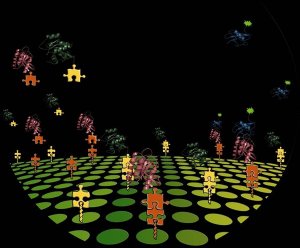Sep 17 2010
Researcher Pascal Jonkheijm of the MESA+ research institute at the University of Twente has won a €1.5 million individual ERC Starting Grant. He will be using the grant over the next five years for research work creating artificial cell membranes on microchips so that, among other things, he can measure how living cells communicate with each other.
The cell membranes of a living cell are covered in dozens of different biomolecules such as enzymes, receptors and growth factors. These play a crucial role in the transfer of signals between different cells, and between a cell and its surroundings. To gain a better understanding of these fundamental cellular processes, Jonkheijm will replicate cell membranes on a microchip, and use supramolecular chemistry techniques to place a variety of biomolecules in patterns on the cell membranes. The chips contain miniscule circuits and fluid channels that allow researchers to measure how the biomolecules on the artificial cell membranes communicate with those of living cells.

In his research Jonkheijm will be examining how various biomolecules react to each other, and how they can be 'switched on and off' using external stimuli such as light and electrical pulses.
Jonkheijm's research should lead to new insights into fundamental cellular processes. He says that the knowledge gained can give an impetus to research into biomaterials for regenerative medicine.
ERC Starting grant
ERC Starting Independent Researcher Grants (ERC Starting Grants) are prestigious European grants that are awarded to individuals. Awards are not only made on the basis of the submitted research proposal, but also on the quality of the researcher and his or her earlier research. Jonkheijm plans to use the grant to appoint five postgraduate researchers and one postdoctoral researcher.
Pascal Jonkheijm
Pascal Jonkheijm has worked as an assistant professor at the University of Twente since January 2008 in the Molecular Nanofabrication research group led by professor Juriaan Huskens, having previously obtained his PhD from Eindhoven University of Technology in the Macromolecular and Organic Chemistry research group of professor Bert Meijer. He earlier worked at the Max Planck Institute for Molecular Physiology in Dortmund under professor Herbert Waldmann. Jonkheijm was awarded a Veni grant in 2007.